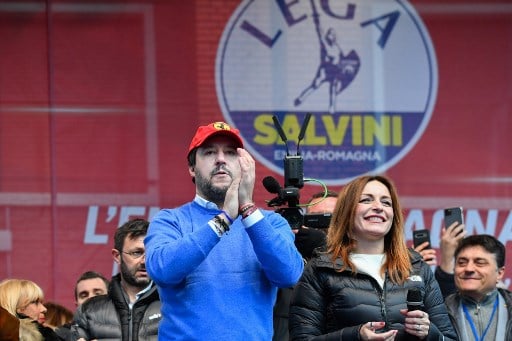Salvini, the former interior minister and leader of the anti-immigrant League, opted for shock tactic during a visit to Bologna on Tuesday to shore up the vote ahead of weekend regional elections.
In the widely-circulated videos, Salvini – surrounded by cameras and a neighbourhood resident – rings an apartment building buzzer.
READ ALSO: Thousands rally in Bologna against far right ahead of regional vote
When a person answers, Salvini says he's heard that drugs are sold there and asks whether or not it's true.
After being hung up on, Salvini asks the crowd around him, “That was him? He's Tunisian?”
On Thursday, Tunisia's ambassador to Italy, Moez Sinaoui, told Italian newswire AGI he was “concerned by the embarrassing conduct” of Salvini, calling it a “provocation with no respect for a private residence.”

A protester in Bologna holds a sign bearing comments made by Matteo Salvini in recent years. Photo: AFP
Salvini is no stranger to provocation and drug dealing is a common refrain in his highly publicised media stunts.
He called the government “drug dealers” when parliament voted to approve the sale of a mild version of cannabis last year (though the bill was thrown out) and often ventures into the main piazzas of Italian cities saying he'll chase away dealers.
In the video Salvini buzzed the residence a second time, saying he wanted to “restore your family's good name because someone says that you and your son deal drugs.”
Italian media reported that the son had sought the assistance of a lawyer for possible legal action against Salvini.
“I'm not a drug dealer. I play football. In a few months I'm going to be a father,” said the young man in a video posted on La Repubblica, who said he was born in Italy to Tunisian parents. “Salvini better take that video off the web.”
An NGO, the Tunisian Forum for Economic and Social Rights, called Salvini's actions a “hateful election propaganda move” and pledged any legal assistance needed.
On Twitter on Wednesday, Salvini said he did not regret his actions.
“I did well to buzz, I don't regret it at all, I don't care if drug dealers are Italian or Tunisian. Drugs kill. Whoever picks the League, picks the fight against drugs,” he wrote.
READ ALSO: How Matteo Salvini lost his gamble to become Italy's PM – for now
The right-wing populist League party is hoping to score an historic upset in Sunday's elections in the Emilia Romagna region, historically dominated by the left, where the right has recently made inroads.
Salvini's own party this week voted for him to stand trial over an alleged abuse of power while serving as Italy's interior minister last year – a move critics say is an attempt to position Salvini as a “martyr” ahead of regional elections.
Polls say the race is roughly tied with the Democratic Party (PD).
The League leader hopes that victory in Emilia Romagna could bring about the collapse of the current coalition governmentb, etween the centre-left PD and the anti-establishment Five Star Movement, and spur a new general election – though Italian Prime Minister Giuseppe Conte has said this won't happen.
“Saying that the regional elections are a vote on the government is wrong,” he told Italian radio.



 Please whitelist us to continue reading.
Please whitelist us to continue reading.
A politician listening to the people and doing something with them who would have thought?
Residents are sick of these people destroying there lives.
So getting a mob together and accusing some random Africans of being drug dealers with no evidence? This is what Italy wants to be?
Racist ignorance.